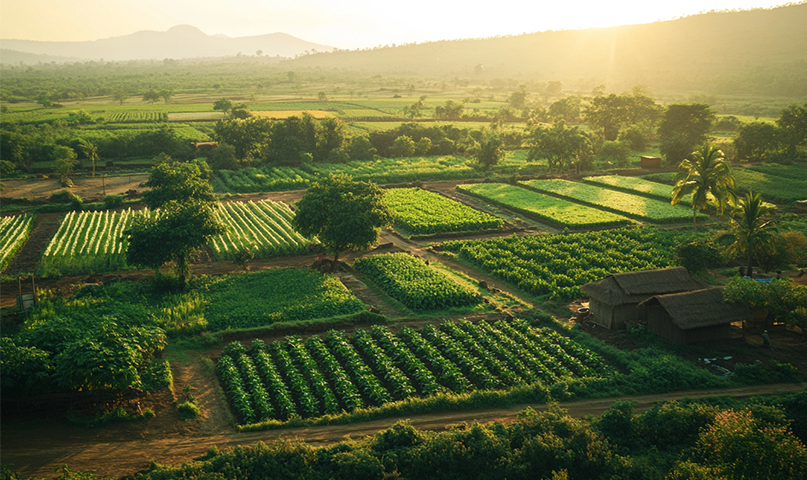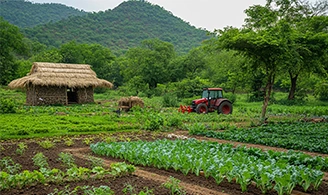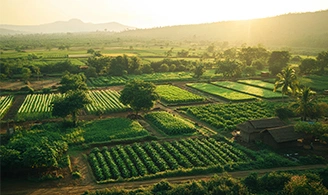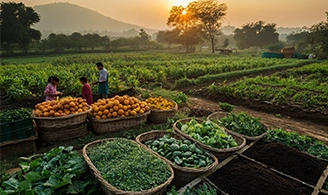Organic farming in India: Types, benefits, and its importance

In a world increasingly concerned about food safety, environmental sustainability, and soil health, organic farming has emerged as a powerful alternative to conventional agriculture. India, with its vast agricultural heritage, biodiversity, and traditional knowledge systems, is uniquely positioned to lead the global organic movement.
From the rising demand for organic products in urban areas to government initiatives encouraging chemical-free farming, organic agriculture in India is witnessing a significant transformation. But what exactly is organic farming, what are its different types, and why is it so crucial for the Indian context?
Let's explore the types, benefits, and importance of organic farming in India in this in-depth blog.
What is organic farming?

Organic farming is an agricultural system that relies on natural inputs like compost, green manure, bio-fertilizers, and biological pest control. It completely avoids synthetic chemicals, pesticides, GMOs, and chemical fertilizers. The main aim is to maintain soil fertility, protect biodiversity, and produce safe, nutritious food.
Organic farming isn't new to India. Traditional Indian farming methods, used for centuries before the Green Revolution, were based on sustainable, chemical-free practices. Today, organic farming combines this indigenous wisdom with scientific methods and appropriate use of modern tractor to create a more holistic farming approach.
Types of organic farming in India

Organic farming in India can be categorized based on the techniques used and the scale of operation. Here are the major types:
- Pure organic farming
This is the strictest form where only natural inputs like manure, compost, neem extract, or biopesticides are used. No synthetic chemical or pesticide is permitted at any stage.
- Integrated organic farming
A mix of organic and modern methods. It focuses on optimizing farm resources—like using crop residues, animal waste, and agroforestry—to reduce dependence on external inputs.
Example: A farmer raising cows for manure, using their waste to fertilize crops, and growing multiple crops on the same land.
- Permaculture
Permaculture involves designing agricultural ecosystems that mimic natural systems. It focuses on self-sufficiency, soil regeneration, water harvesting, and minimal land disturbance.
- Biodynamic farming
This type of organic farming uses cosmic rhythms and homeopathic preparations to improve soil fertility and plant growth. It was developed by Rudolf Steiner and is gaining popularity in India, especially in vineyards and tea estates.
- Natural Farming (Zero Budget Natural Farming - ZBNF)
Promoted by Subhash Palekar, ZBNF encourages using desi cow dung, urine, and natural solutions like Jeevamrut and Beejamrut. It has gained immense popularity in states like Andhra Pradesh and Maharashtra.
Benefits of organic farming

The shift to organic farming comes with a range of economic, environmental, and health-related benefits. Let's break them down:
- Healthier food
- Organic produce is free from harmful chemical residues.
- Richer in nutrients, antioxidants, and natural flavors.
- Safer for children, elderly, and pregnant women.
- Improved soil health
- Use of compost, green manure, and crop rotation improves soil fertility and structure.
- Increases microbial activity and organic matter.
- Prevents long-term soil degradation caused by chemicals.
- Environmental sustainability
- Reduces pollution of groundwater, rivers, and soil.
- Encourages biodiversity by supporting pollinators, beneficial insects, and soil organisms.
- Reduces carbon footprint by cutting down on synthetic fertilizers and pesticides.
- Better water management
- Organic farming improves water retention in the soil.
- Encourages use of drip irrigation and mulching, reducing water wastage.
- Economic benefits for farmers
- While initial yields may be lower, input costs are also significantly reduced.
- Premium prices for organic products (20–40% more than conventional).
- Increasing export opportunities in markets like the US, EU, and Gulf countries.
- Safe work environment
- Farmers and workers are not exposed to toxic chemicals.
- Reduces risks of long-term health issues like cancer, respiratory problems, and skin diseases.
Importance of organic farming in India

- Small and marginal farmers can benefit
Over 85% of Indian farmers are smallholders. Organic farming helps reduce their input costs by using locally available resources like cow dung, plant leaves, and compost. This makes farming more cost-effective and sustainable.
- Growing market demand
Urban consumers are increasingly health-conscious and prefer organic produce. The Indian organic market is growing at over 20% annually, with rising demand for products like organic grains, vegetables, spices, and herbal teas.
- Climate-resilient agriculture
Organic farming enhances soil carbon sequestration and improves soil's water-holding capacity, making crops more resilient to droughts and climate change.
- Government support through initiatives like:
- Paramparagat Krishi Vikas Yojana (PKVY)
- Mission Organic Value Chain Development for North-Eastern Region (MOVCDNER)
- National Programme for Organic Production (NPOP)
These offer subsidies, training, and certification support to promote organic farming across India.
- Export potential
India is among the top producers of organic cotton, spices, tea, and pulses. Export of organic products crossed ₹7,000 crore in recent years, with major buyers being the US, EU, Canada, and Australia.
- Reviving traditional farming knowledge
Organic farming brings back ancient Indian agricultural wisdom, such as crop rotation, natural pest repellents, intercropping, and mulching—practices that have sustained Indian agriculture for centuries.
Challenges in organic farming

Despite the benefits, organic farming in India still faces some challenges:
- Initial transition period of 2–3 years with lower yields.
- Lack of organic certification awareness among farmers.
- Marketing difficulties and supply chain gaps.
- Higher labor demand for manual weeding and pest control.
However, these are being addressed with government policies, training programs, and digital platforms connecting organic farmers to consumers.
The future of organic farming in India

With increasing awareness about food safety, environmental issues, and farmer welfare, the future of organic farming in India looks very promising.
What's driving the growth:
- Digitization and farm-to-fork platforms (e.g., BigBasket Organic, Organic India, Krishi Jagran).
- Celebrity and influencer endorsements of organic lifestyles.
- Export incentives and rising global demand.
As consumers become more aware and farmers receive better support, organic farming could become the backbone of sustainable agriculture in India.
Conclusion
Organic farming is more than just a method, it's a movement toward healthier living, sustainable ecosystems, and farmer empowerment. For India, a nation deeply rooted in agrarian culture, embracing organic farming offers a path toward resilient rural economies, safer food, and ecological balance.
By adopting organic practices—whether through pure, natural, or integrated systems—Indian farmers can lead the charge toward a greener and more sustainable agricultural future.
















